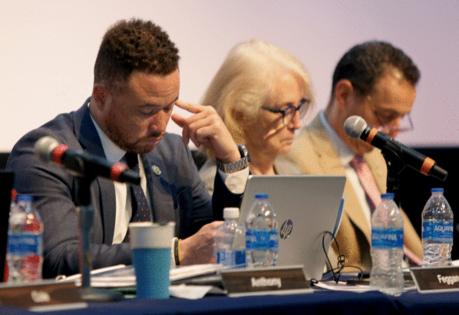Committee studying federal cuts warns Virginia should prepare for additional spending
Published in News & Features
RICHMOND, Va. — The General Assembly’s emergency committee to study the effects of federal cuts warned Thursday that though Virginia’s economy appears strong now, lawmakers should be cautious about spending given the expected added costs the state will incur as a result of cuts to federal spending.
Legislative staff presented findings and some policy recommendations to that committee and to the House Appropriation Committee as members met for the fifth time at General Assembly Building.
“While the impacts of the reconciliation bill involves one-time costs, many of the items will require a long-term commitment of resources,” said Del. David Bulova, a Democrat who chairs the federal impacts committee. “While our current unappropriated balance provides some flexibility to deal with one-time costs, it is not prudent to use one-time funds for ongoing obligations. This will be a challenge and prioritization will be a key.”
The state currently has unappropriated funds totaling $900 million. That will cover some, but not all of the $2 billion additional spending that Virginia is estimated to pick up as it prepares the next biennium budget. Much of the planned additional spending is for K-12 education and Medicaid, but other costs are expected as a result of federal changes.
For example, a new state matching requirement for the Supplemental Nutrition Assistance Program, also known as food stamps, would equate to an additional $270 million per year beginning in 2027 based on the state’s current payment error rate of 11%.
“If the state’s error rate is below 6%, there’s no matching requirement,” said Amy Cochran, a legislative fiscal analyst for the House Appropriations Committee. “However, our average error rate for the past several years has been around 9.5%. Even if we’re able to get our error rate below 10%, that will still cost the state $180 million.”
The error rate represents the accuracy of each state’s eligibility and benefit determinations. Localities administer SNAP, and some errors can occur because of the self-reporting done by individuals, like if their salary increases because of a promotion.
The state will also have to pay $90 million a year beginning in October 2026 in SNAP administrative costs.
If Virginia is going to continue federal programs such as the enhanced premium tax credit for people at certain income levels who purchase health insurance using the market place, that could cost $250 million annually. The credits, established by the Affordable Care Act, are set to expire in December unless Congress renews them.
Other costs, such as redetermining SNAP and Medicaid eligibility with increased frequency, are yet unknown.
Some of the policy recommendations from the report pertained to data gathering, such as directing the Departments of Medical Assistance Services and Social Services to provide cost estimates of implementing the new redetermination requirements.
The report also recommended directing public universities and community colleges to estimate changes to the Pell Grant program and caps on student loan programs, and that the Department of Planning and Budget collect information on canceled federal grants.
Other policy recommendations respond to federal workforce reductions, such as amending the Landlord-Tenant Act to allow federal workers who were laid off to break their lease early and extending the length of time workers could collect unemployment insurance.
There are other uncertainties, too. Congress is still in the budgeting process. Currently, the House version of the budget bill reduces federal support for K-12 education by $9.9 billion nationally and eliminates funding for programs such as English language acquisition and programs for migrant and homeless students.
And though unemployment in Virginia was at 3.6% in July — below the national average of 4.2% — it’s been on the rise since January and could climb higher in the fall, when federal workers’ deferred resignations end.
“We’ve got a raised sense of risk to our revenues, which we knew in March, when we started this,” said Del. Rob Bloxom, a Republican, who sits on both the federal impacts committee and the House Appropriations Committee. “We’re exceeding our forecast every month — not to say that there won’t be issues that we have to deal with in the coming months.”
Right now, Virginia’s economy appears strong. The state continues to see higher than expected monthly revenues.
But Chair of House Appropriations Luke Torian, a Democrat, urged caution.
“We can tout how strong our economy is right now in the commonwealth, and it is in a good position,” he said.
But, he said, the state will only dip into its reserve funds as a last resort. That could mean lawmakers should prepare for some belt-tightening.
“We will work hard to appropriate the resources where they are needed to meet the basic fundamental needs of the citizens of the commonwealth — that would be health care, education, increasing our job workforce as much as we possibly can,” he said. “Be mindful of this report, and be mindful of the expectations that you may bring to Richmond come January 2026.”
©2025 The Virginian-Pilot. Visit pilotonline.com. Distributed by Tribune Content Agency, LLC.







Comments